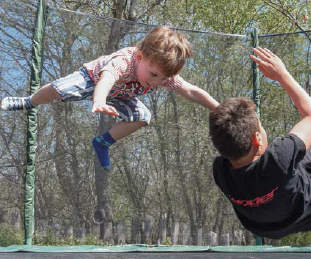Call 2: Make it your business to tackle child poverty
By John McKendrick
Loss of the village
Those of a certain age are prone to lament the demise of community and neighbourhoods where the welfare of children was the responsibility of parents, friends and wider family. Times certainly have changed, often for the better, but in some respects for the worse.
Without doubt, our lives are more complex, faster and inter-connected. And these changing times have spurned a paradox with regards to tackling poverty – if we yearn for times when everyone was more concerned for the welfare of others, why then are we content to attribute the primary responsibility for tackling child poverty to government?
What Scots think – tackling child poverty is the business of government … but parents are largely to blame
Every few years, the British Social Attitudes survey asks the people of Scotland (as part of its wider study) to identify who is responsible for tackling child poverty. The results are broadly stable through time.
A few years ago, I posed the same question with a few additional options to a representative sample of more than 1000 adults in Scotland. Around three quarters of people in Scotland think that the national government (both UK and Scottish) has a responsibility for tackling child poverty, with around two-thirds thinking the same for local government.
No other response gets majority support, although just under half of us think that parents have a responsibility, around one third think that both the voluntary sector and friends/relatives have a responsibility, and around one in five think that business has a role to play.
Interestingly, when the same Scots are asked to identify the main reason for child poverty, very few attribute it to the factors which are within the realm of government, for example ‘social benefits not paying enough’ or ‘because of inequalities in society’ (which could in theory be tackled through progressive taxation). Rather, we Scots are more likely to blame parents on account of perceiving them to be troubled (suffering from alcoholism, drug abuse or other addictions) or by not achieving in the labour market.
So, we look for solutions from government and blame parents … but is there another way?
Extending professional reach
The Attainment Challenge has emphasised the importance of our education system in tackling disadvantage and enabling all of our children to realise their potential.
High profile initiatives such as free school meals for Primary 1-3, breakfast clubs, the Pupil Equity Fund, raising the allowance for school clothing grants and the excellent work of the Child Poverty Action Group (CPAG) in scrutinising the cost of the school day are all making headway in overcoming the barriers faced in schools by children experiencing poverty.
However, there is another initiative that has received much less attention but is equally deserving of praise. A few years ago, the EIS teachers’ union published Face up to Child Poverty a short booklet for union members that concisely described the nature of six problems (hunger, school uniform, equipment, homework, school trips and fundraising activities) and offered succinct advice on what they could do as part of their everyday work to ameliorate, avoid or eradicate a poverty-related problem.
Tackling poverty must be systemic and systematic. However, there is also a pressing need for actions that seem incidental, and which are rooted in interpersonal interaction and everyday contexts. Much progress could be made in improving the lives of Scotland’s most disadvantaged children if other professional groups followed the lead of the EIS and practitioners acted on the good advice therein.
Making an impact locally
On 18 December 2017 the Child Poverty (Scotland) Act 2017 received Royal Assent, making the historical commitment to ‘eradicate’ child poverty in Scotland by 2030. This due process followed the passing of the Child Poverty (Scotland) Bill on 8 November 2017, with 115 MSPs voting in favour and none against.
Most significantly, each local authority and each relevant Health Board must prepare a local child poverty action report, as soon as is practicable after the end of each reporting year (31 March).
This should comprise (in relation to tackling child poverty): any measures taken during the reporting year; any measures that it proposes to take; any income maximisation measures supporting pregnant women and families with children; and any measures taken that impact on the household income of those comprising children with protected characteristics.
This has the potential to be a game-changer. However, these local strategies will not achieve their ends if no attempt is made to share (or grasp) ownership among the wider population and interest groups. A local strategy that is a showcase and blueprint for the good work of local authorities is interesting and valuable, but also insufficient.
Local strategies need to belong to everyone and we need to ensure that professions, communities and interest groups are as central to these 32 strategies as local authority/NHS departments and budgets.
Everyday impacts every day: the way ahead for tackling child poverty in Scotland
What I am suggesting amounts to a cultural change. Some might argue that these are difficult to achieve, but we have had one already – we now accord responsibility for tackling child poverty to the disconnected apparatus of government, whereas once it was viewed as the responsibility of close-knit communities working collectively. Things are not so good now that we should continue on regardless and things were never so good that we should aspire to return to the past. Rather, Scotland’s children deserve a better future and we need a third dimension that builds on both the interventions of government and everyday community support.
This means all of those who engage with children should be thinking about what they can do to ameliorate or even tackle poverty through their everyday interactions with children experiencing poverty, be they butchers, bakers or candlestick makers (and, of course, caterers, doctors, youth workers, shop assistants, teachers, bus drivers, and so on). We also need to hold government to account. It is laudable that the Scottish Government has committed the nation to eradicate child poverty by 2030. It is exciting that Scotland’s 32 local authorities (alongside their NHS partners) will be developing their own action plan to tackle child poverty locally.
But it will be shameful if we don’t all contribute to capitalising on the opportunity that presents to realise a child poverty-free Scotland within a generation.
Richard Wilkinson, co-author of The Spirit Level and The Inner Level, tells Children in Scotland how inequality impacts all of us – and how to counter it
Our young people’s advisory group chose access to mental health support as their top priority (Call 3). Why is this such an urgent issue?
It’s extraordinary how recent discussion of the scale of mental health issues has focused almost wholly on access to services rather than on the appalling increases in levels of mental stress. Services merely pick up the pieces after the damage. Although people often blame social media, it's only the messenger. The truth is that as inequality makes societies more antisocial, we use social media more hurtfully than we would in an egalitarian society.
Key to these problems is the way inequality increases the importance of social comparisons, making us all more worried about how we are seen and judged. As a result, some withdraw from social contact, finding it too stressful. Others big themselves up by using consumerism to boost their image and flaunting their status and successes.
What inequality does is make status and class more important. It ups the stakes on the idea that some people are worth more than others intensifying our doubts about self-worth.
How does discrimination on the grounds of gender, race, age and sexual orientation figure in producing poorer wellbeing in young people?
They’re spin-offs of the same issues. Given that there is this huge differential in how much people are valued, no one wants to belong to a group seen as inferior. Whether it’s class accents, skin colour, religious affiliation or gender identity, when any of these become markers of inferiority or low social status, they attract stigma and discrimination. We must reduce that stigma by making sure there isn’t a huge differential in how people are valued. We must make sure the social ladder is less steep.
Do you think we should be concentrating policy efforts more on achieving equality of outcome or equality of opportunity?
Equality of opportunity and equality of outcome are not things we can change independently of each other. If you want to improve equality of opportunity for children, probably the most important thing you can do is reduce inequality of outcomes among parents. Parents always pass on their advantages or disadvantages to their children.
Downward social prejudices increase in societies with bigger income differences, making it harder for children to move up. We need to shift towards a society where social position is not the thing you judge people by most. It’s often claimed that children from poor backgrounds have a poverty of aspiration.
But we looked at data on this and found it tended to go the opposite way; children’s aspirations – at least for money and fame – were higher in more unequal societies. We need to value and respect a greater range of occupations.
What do you think about automation and its impact on young people’s employment over the next 25 years?
It’s a crucial challenge - but the hope that the economy will create enough jobs to fill the gap is really only the hope that we carry on as we are. I would much rather we brought on automation as fast as we can, and that we used it to reduce the workload to give us a society with much more leisure so we had time for each other.
That goes with the need for universal basic income of some form. If people had more free time and some financial support independently of work, we might all become part of a sharing economy. That’s what human interaction ought to be about.
Are you optimistic about the future for young people?
Much depends on responses to climate change. The environmental movement increasingly regards greater equality as a necessary precondition for sustainable wellbeing. If we go on as we are, we won’t save ourselves from the profound decline in the quality of life climate change will bring. But it’s clear there is another path, through greater equality to sustainable wellbeing.
Will the rich carry on with the system as it is and use their money to protect themselves while the rest of the population goes to the wall, or do we force a more fundamental sharing? It’s not simply a matter of tightening our belts and trying to live the same rather unsatisfactory lives, it’s about finding new ways of improving the real quality of life, improving the social environment and reducing stress levels through greater equality.
Follow #25Calls to see which organisations have endorsed this call.
Article 27 – United Nations Convention on the Rights of the Child: '...the right to a standard of living adequate for the child's physical, mental, spiritual, moral and social development...'

25 Calls
Return to the main 25 Calls page to find out what change others are calling for
Visit the pageScottish Poverty and Inequality Research Unit
Find out more about this multi-disciplinary research group
Click hereUnited Nations Convention on the Rights of the Child
Article 27: "...the right to a standard of living adequate to the child's development..."
Learn more